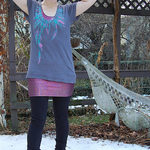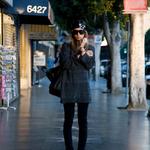- Related topics: Below you will find more in depth information on this topic...
-
Racism in Fashion
-
Racism in Fashion Magazines
-
Racism in Fashion Photography
Share Your Style
Style Icons
Racism in Fashion
More individuals are taking a stand against the apparent racism in fashion it appears that this deep-rooted issue is not going anywhere anytime soon and black models and designers will suffer on a long road trying to become recognised in a predominantly white world. All we can do as a community is to encourage those models making waves such as Jourdan Dunn, Malika Firth and Alisha White and continue the battle against this endemic in the fashion industry.
But i will still ask this, will we ever be able to compete or maybe should i say work together with our white counterparts as equals? Will our natural deep-rooted creative flare ever get time to blossom to its full potential? i guess only time will tell. There's no doubt that racism in fashion exists. i have experienced it first hand, and i'm not alone. The us has a black President and the wealthiest woman in entertainment is black. so, i ask, why is the fashion industry so far behind the rest of society?
Jezebel not long ago dug up some dirt on the New York Fashion Week, Fall 2013 fashion shows. The things they uncovered is very unsettling. During the period, 151 New York fashion designers showcased at fashion week, providing 4479 'looks'. White models wore 82.7% of these looks. Only 9.1% of looks were shown on Asian models, and Black models were employed for just 6% of looks. Non-white Latin models presented 2% of the looks and models with races not defined by these categories were given 0.2%. Many designers - such as big names like Calvin Klein and Juicy Couture - hired no models of colour at all.
This issue is not confined to the runways. Paris Vogue Editor in Chief, Emmanuelle Alt, has not used an African or Asian model on the cover of her magazine in over two years. she's been in charge of twenty-four issues, which have included four covers of Kate Moss and one of Gisele Bundchen's bum. Lord forbid she inject a bit of diversity! French Numero is also a culprit, publishing a very controversial editorial, showing white American model Ondria Hardin, with darkened skin. The spread was given the title 'African Queen'.
Now, you can't tell me there were no African models available to do the job instead of Hardin. Rising stars Malaika Firth or Maria Borges could've conveniently stood in Hardin's place. Although the magazine apologised for any offence caused - stating they have "regularly demonstrated... deep attachment to various skin-coloured models" - of the last 141 covers, only three models that were featured, were not white.
Our world has an abundance of diversity, but why isn't it reflected in fashion? Hong Kong, singapore and Tokyo are all ranked within the top twenty international markets for fashion, along with renowned fashion capitals, New York and London. Also emerging as a big-tier consumer, is the city of Dubai, with several fashion houses such as Chloe, and Elie saab setting up flagship stores there.
Now, if the people of these cities are some of the biggest consumers of your brand, why wouldn't you use your promotion strategies to appeal to them? if people don't see themselves wearing or making use of products, they are far less likely to buy them. in saying that, designers and casting directors shouldn't use an Asian model, for example, to appeal to the Chinese consumer, just because China is the next big market.
Prominent models like Jourdan Dunn have spoken out about this kind of tokenism, relating how her agents would call her, telling her not to bother showing up for specific castings as "they've already hired a black girl". since when are races classified as some novelty or trend?
Australia is a beautiful multicultural country, so the chances of finding a blonde haired, blue eyed beach babe are a lot less than seeing us 'ethnic looking' people. One of the companies in the city only represents one black model. With a huge African community in Australia, that's just not good enough.
A good model is a good model, and they should be able to adopt any character, regardless of their skin colour. Fortunately, numerous people are speaking out about this issue. supermodels iman, Naomi Campbell and Bethann Hardison founded the Diversity Coalition, writing to the fashion councils of New York, London, Milan and Paris, to demand change. More influential people in fashion need to stop playing the blame game - agents blaming designers for not hiring a diverse mix of models, designers blaming agents for not providing non-white models - and work together for some real change.
Be the first to comment
Other Topics
 When did Guys wearing Skinny Jeans become Acceptable?Not too long ago, skinny jeans were completely rejected by men, including fashion designers. Even today, skinny jeans are not generally approved of or...Read the rest of this fashion article.
When did Guys wearing Skinny Jeans become Acceptable?Not too long ago, skinny jeans were completely rejected by men, including fashion designers. Even today, skinny jeans are not generally approved of or...Read the rest of this fashion article. Why Sharing Your Clothes Is Not A Good IdeaMost people at one time or another has loaned a sibling, friend or a roommate an article of clothing from their wardrobe. In some cases, siblings or r...Read the rest of this fashion article.
Why Sharing Your Clothes Is Not A Good IdeaMost people at one time or another has loaned a sibling, friend or a roommate an article of clothing from their wardrobe. In some cases, siblings or r...Read the rest of this fashion article. Everything you need to know about Big Baller BrandBig Baller Brand, trademarked as BBB, is an apparel and footwear company based at Chino Hills, California in the United States. The private company wa...Read the rest of this fashion article.
Everything you need to know about Big Baller BrandBig Baller Brand, trademarked as BBB, is an apparel and footwear company based at Chino Hills, California in the United States. The private company wa...Read the rest of this fashion article. Should Your Boyfriend Like the Way You Dress?Lets face it, what girl doesn't like to dress good and look sexy from time to time. You occasionally like to dress in that low-cut top, short dress or...Read the rest of this fashion article.
Should Your Boyfriend Like the Way You Dress?Lets face it, what girl doesn't like to dress good and look sexy from time to time. You occasionally like to dress in that low-cut top, short dress or...Read the rest of this fashion article. Kylie Jenner A Fashion Mogul?Kylie Jenner is a fashion icon. There is no debating that. Whether or not she is a fashion mogul is yet to be ascertained. The American model and entr...Read the rest of this fashion article.
Kylie Jenner A Fashion Mogul?Kylie Jenner is a fashion icon. There is no debating that. Whether or not she is a fashion mogul is yet to be ascertained. The American model and entr...Read the rest of this fashion article. Fitting Room EtiquetteFitting rooms, or as I call them, The AA Room (Addicts Anonymous Room, I will explain later) in clothing stores are not a requirement but are favorabl...Read the rest of this fashion article.
Fitting Room EtiquetteFitting rooms, or as I call them, The AA Room (Addicts Anonymous Room, I will explain later) in clothing stores are not a requirement but are favorabl...Read the rest of this fashion article. Ashley Benson's Fashion Sense
Ashley Benson is an up and coming actress from the popular ABC television series pretty little liars. Ashley Benson plays Anna Marin a popular 'it...Read the rest of this fashion article.
Ashley Benson's Fashion Sense
Ashley Benson is an up and coming actress from the popular ABC television series pretty little liars. Ashley Benson plays Anna Marin a popular 'it...Read the rest of this fashion article. How to Dress Like a RockstarDo you know how to dress like a rockstar? Well to dress like a rockstar you need to have lots of funky fashion. Don't be afraid to express yourself. e...Read the rest of this fashion article.
How to Dress Like a RockstarDo you know how to dress like a rockstar? Well to dress like a rockstar you need to have lots of funky fashion. Don't be afraid to express yourself. e...Read the rest of this fashion article. How Much Cleavage Is Too MuchBelieve it or not but breasts have etiquette's attached to them and in life, it is important for a woman to understand the whole concept of how much c...Read the rest of this fashion article.
How Much Cleavage Is Too MuchBelieve it or not but breasts have etiquette's attached to them and in life, it is important for a woman to understand the whole concept of how much c...Read the rest of this fashion article.

















